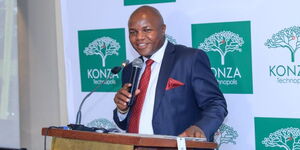Kenyans have always been curious about where the money in the accounts of loved ones go in the unfortunate event that they pass on.
According to Unclaimed Financial Assets Authority's (UFAA) website, heirs should constantly check for the status of deceased relatives.
You can only claim this money if you are the executor of the will or personal representative.
The documents to be provided by the next of kin depend on the circumstance of the customer’s death.
Furthermore, anyone can have unclaimed assets so it is advisable for people to constantly check their status.
Also, there is no limit for lodging a claim with UFAA. Owners can claim their assets at any time.
Keep reading this article and find out how you can reclaim personal or loved ones' assets.
What is UFAA?
The Unclaimed Financial Assets Authority (UFAA) is an Authority created under the Unclaimed Financial Assets Act, No. 40 of 2011 to administer unclaimed financial assets.
The primary mandate of the Authority is to receive unclaimed financial assets from the holders of such assets, safeguard and re-unite the assets with their rightful owners.
You do not lose any financial assets once remitted to UFAA. Indeed, UFAA on behalf of the Government exercise responsibility as “Bona Vacantia” (holder of assets in the public interest) and guarantee you an indefinite right of reunification.
Any person can have unclaimed assets considering you may have put in a deposit in a bank, rented a facility or earned wages.
What is a holder?
A holder (or a holding institution) is an entity which is in possession of a financial asset on behalf of an owner.
These institutions can be banks, insurance companies, business, etc
These entities are responsible for identifying, segregating, reporting and remitting unclaimed assets to UFAA.
What does "unclaimed assets" mean?
In the event that an owner of a property does not take any action during certain duration by law, to indicate his/her ownership, interest, or awareness, that property will be regarded as unclaimed.
As a result of such developments, it then comes a responsibility of the holding institution to report it to the proper state agency (UFAA).
The modern rationale for such an arrangement is that the state can best preserve and protect the interest of the rightful owner and possibly reunite the owner with his/her property.
How do assets become “unclaimed”?
According to section 3-18 of Unclaimed Financial Assets (UFA) Act, 2011 unclaimed assets have to meet the following conditions:
1.When records of the holder do not reflect the identity of the person enlisted to the assets.
2.When the holder has not previously paid or delivered the assets to the apparent owner or other person entitled to the assets.
3. The last known address, as shown on the records of the holder, of the apparent owner is in a country that does not provide by law for the escheat or custodial taking of the assets or its escheat, or unclaimed assets law is not applicable to the assets and the holder is domiciled in Kenya.
4.Other ways that assets become unclaimed:
Death
Forgetfulness
Poor record keeping
Relocation (Regional & global)
Ignorance
Negligence
Note: Assets are considered “abandoned property” when they appear to have been forsaken by their owner by virtue of no generated activity and to which it is presumed the owner has relinquished his or her interest to the property without vesting such interest in another person or entity.
What are examples of unclaimed assets?
1. Dormant accounts at banks.
2. Unclaimed dividends and interest earned from stocks and shares.
3. Unclaimed utility deposits in books of power and water companies.
4. Unclaimed retirement benefits at insurers and pension administrators.
5. Unclaimed death benefits and annuities from insurance companies.
6. Unclaimed bail and bond money deposited in Courts of Law.
7. Unclaimed deposits and benefits from collapsed institutions.
8. Uncollected prize money e.g. from a lottery.
How long do different types of assets take before being considered unclaimed?
[Asset] [Duration of Abandonment]
1. Traveller’s cheque (2 years from the date of issuance)
2. Money order or similar written financial/ monetary instrument (2 years from the date of issuance)
3. Cheques, drafts or similar instruments (2 years after it was payable or after its issuance)
4. Demand, savings, matured time deposit, funds paid towards the purchase of a share, mutual investment certificate, any other interest in a financial institution (5 years)
5. Life or endowment Insurance policy or annuity contract (2 years after the funds become due)
6. Assets as a result of demutualisation of an insurance company (2 years after the date of the demutualisation)
7. Deposit for utility services e.g. electricity, water, etc. (2 years after termination of the services)
8. Order by a court for refund by holder (2 years after it became payable)
9. Ownership interest (3 years)
10. Assets from dissolved business entity (2 years)
11. Assets held in a fiduciary capacity (2 years after they become payable)
12. Gift certificate, gift card or credit memo/note (5 years)
13. Unpaid wages (1 year after they become payable)
14. Assets held in safe deposit box or repository (2 years after the lease or rental period on the box or repository has expired)
How long does it take to process a claim?
A person claiming an interest in any assets paid or delivered to the Authority may file with the Authority a claim as prescribed by the Authority.
The Authority shall consider each claim within ninety days after it is filed and shall give written notice to the claimant of its decision.
Where a claim is allowed, the Authority shall pay over or deliver to the claimant the assets or the amount the Authority actually received or the net proceeds if it has been sold by the Authority.
A person who is aggrieved by a decision of the Authority or whose claim has not been acted upon within ninety days after its filing may bring an action in court against the Authority.
How can I prevent my assets from being considered “unclaimed”?
1. Be an active owner: cash cheques, dividends, and insurance benefits no matter how small.
2. Keep making deposits into your accounts at least once a year to avoid having dormant accounts.
3. Always inform all interested parties of a change in your address.
4. Keep accurate financial records of bank accounts, stocks, safe deposit boxes, and insurance policies.
UFAA claiming instructions
Specify your preferred mode of payment on your claim form.
The Authority does NOT make payments in cash.
Provide details for one of the following modes:
1. Bank transfer - give account details e.g. name of bank, branch and account number.
If one of the following cases applies to you please attach the following details:
1.Affidavit for change of name, if the name on the ID is different from that on any other identity document for the claimant or if the name of a company has changed.
2.If claiming a banker’s cheque submit the original banker’s cheque or affidavit for loss.
3.If claiming an insurance policy submit the original policy document/ affidavit for a lost policy document.
Claiming by Original Owner
Where the owner is claiming, the following are the requirements:
1. Completed form Original Owner(s) claim form ( Form 4A) duly commissioned.
2. Completed Indemnity agreement (Form 5) duly commissioned.
3.An official letter received from the holder confirming remittance of unclaimed financial assets to the Authority.
4.Certified copy of the claimant’s national identity card or passport (Certified by a lawyer).
5.Copy of claimant’s KRA PIN certificate.
6. Claimant's bank details indicated on claimant bank details form.
7. Provide Bank Statement of an active account, current deposit slip, or withdrawal slip - clearly showing account name and number to confirm bank account details provided in item 6 above. (if more than one claimant provide a statement of a joint bank account).
Claiming on Behalf (Beneficiary/Deceased cases)
Where the claimant is not the owner but has or asserts a legal right to an unclaimed asset, the claimant shall submit to the Authority the following:
1. Completed beneficiary claim form ( Form 4B) duly commissioned.
2. Completed Indemnity agreement (Form 5) duly commissioned.
3. An official letter received from the holder confirming remittance of unclaimed financial assets to the Authority.
4.Certified copy of the claimant’s national identity card or passport.
5.Copy of claimant’s KRA PIN certificate.
6.Copy of certificate of death.
7.Certificate of Confirmation of Grant/ Certificate of Summary Administration.
8. Claimant's bank details indicated on claimant bank details form.
9.Provide Bank Statement of an active account, current deposit slip or withdrawal slip - clearly showing account name and number to confirm bank account details provided in item 8 above. (if more than one claimant provide a statement of a joint bank account).
Claiming on Behalf (where the owner is alive/agent for the owner)
Where the claimant is not the owner but is claiming as an agent on behalf of a living owner, the following are the requirements:
1. Completed agent for an owner claim form ( Form 4D) duly commissioned.
2. Completed Indemnity agreement (Form 5) duly commissioned.
3. An official letter received from the holder confirming remittance of unclaimed assets to the Authority.
4. Certified copy of the claimant’s national identity card or passport.
5. Copy of claimant’s KRA PIN certificate.
6. Registered power of attorney. (Registered at the Ministry of Lands)
7. Claimant's bank details indicated on claimant bank details form.
8. One page copy of recent bank statement, current deposit slip or withdrawal slip (clearly showing account name and number) to confirm bank account details provided in item 7 above.
Claiming on Behalf of a minor
Where the claimant is claiming on behalf of a minor who is an original owner, the following are the requirements:
1. Completed agent for an owner claim form ( Form 4D) duly commissioned.
2. Completed Indemnity agreement (Form 5) duly commissioned.
3. An official letter received from the holder confirming remittance of unclaimed financial assets to the Authority
4. Certified copy of the claimant’s national identity card or passport.
5. Copy of claimant’s KRA PIN certificate.
6. Guardianship deed.
7. Claimant's bank details indicated on claimant bank details form.
8. One page copy of recent bank statement, current deposit slip or withdrawal slip (clearly showing account name and number) to confirm bank account details provided in item 7 above (if more than one claimant provide a statement of a joint bank account).
Claiming on Behalf of a business entity
Where the claimant is claiming on behalf of a business entity, the following are the requirements:
1. Completed business entity claim form ( Form 4C) duly commissioned.
2. Completed Indemnity agreement (Form 5) duly notarized.
3. An official letter received from the holder confirming remittance of unclaimed financial assets to the Authority.
4. Current form CR12 obtained from the Company Registrar indicating directors of a company.
5. Certified copy of the directors’ national identity cards or passports (Certified by a lawyer).
6. Copy of directors’ KRA PIN certificates.
7. Certificate of incorporation.
8. Business entity's bank details indicated on the claimant bank details form.
9. One page copy of recent bank statement, current deposit slip or withdrawal slip (clearly showing account name and number) to confirm bank account details provided in item 8 above.












